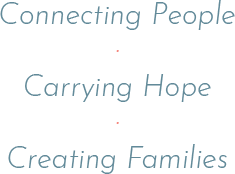

Thinking of Becoming A Surrogate?
At Carrying Hope, we believe in the power of extraordinary women like you, who have the heart to help others experience parenthood. By becoming a surrogate, you can change lives while earning a generous compensation starting at $45,000. If you have ever felt called to do something truly meaningful, this is your moment.
![]()
General Qualifications
Surrogacy is a life-changing journey, but the health and safety of both you and the baby are our top priorities. Our general requirements help to ensure the best experience for the surrogate, the intended parents, and the child. If you qualify, you have the rare opportunity to give an incredible gift while being fully supported every step of the way.
- Be 21 – 42 years of age
- Have had at least one, term, uncomplicated pregnancy
- No more than 3 C-sections
- BMI under 32
- Non-smoker with no history of drug abuse
- US Citizen
- Clear background for you and your spouse/partner (if applicable)
- Ability to travel (expenses covered)
- Financially stable
- No anti-anxiety medication or anti-depressant medication within the last 12 months
![]()
Why Become A Surrogate with Carrying Hope?
Carrying Hope was founded by two former surrogates; therefore, we understand the process and the desired level of support to make this a successful journey. Our team is always available to answer questions, guide you from application process, throughout pregnancy and past delivery.
![]()
Compensation
We here at Carrying Hope want to ensure our surrogates feel supported and secure in their journey. This is why we feel it is necessary to provide our surrogates with a fair and comparable compensation package. We believe this encourages surrogates who are willing to consider surrogacy for the right reasons, while still keeping things in an affordable range for intended parents. We encourage you to review our compensation package here.
![]()
Process

Application

Schedule a consult with Addie, our Intake Coordinator

Collection of medical records & background checks

Profile building

Virtual home study & matching preferences meeting

Match with intended parent(s)

Psychological evaluations

Medical screening

Legal contracts

Embryo Transfer

Pregnancy

Birth
Frequently Asked Questions
What are the different types of surrogates?
A Gestational Surrogate is a woman who is carrying a baby that has no genetic connection to her. The embryo was created by the intended parents using theirs or a donor’s material to create the embryo.
A Traditional Surrogate is a woman who is also using her egg for the creation of the baby. This can be done via IUI or IVF.
Here at Carrying Hope, we only participate in Gestational Surrogacy.
Why surrogacy?
Everyone’s reason for pursuing surrogacy either as a surrogate or an intended parent is individual. Many surrogates know someone who has struggled with infertility, has a medical condition that would deem them unable to safely carry a pregnancy or who has no explanation why, but has faced complications. Each intended parent has a unique story as well. Some are hard to share and some have accepted this path as their choice and are excited to pursue it.
We would love to hear your ‘why’.
How does the surrogate become pregnant?
The intended parent(s) will create embryos with their fertility clinic through IVF and once ready, they will transfer the embryo to the surrogate’s uterus. The process to become pregnant is quite different as there will be very specific timing required and cycles will be closely monitored to be sure the embryo will be transferred into the most ideal of environments to hold the highest chances of success.
Is surrogacy legal in my state?
Most states are considered ‘surrogacy friendly’, however, the laws and process can vary from state to state. If you want to connect with us to learn more about your state, feel free to reach out.
Why are the requirements so strict to become a surrogate?
The requirements can sometimes seem discouraging to some, and some of them actually have some slight flexibility. You can always connect with us to discuss your situation or question. But at the end of the day, we want to be able to ensure all parties, intended parents and surrogates, are doing their journey in a safe and healthy manner. And this starts with the general requirements.
Do I get to choose the intended parents I match with?
Yes! You have just as much say in who you match with as intended parents do. We want everyone to match ideally for them. Here at Carrying Hope, matching is so much more than just what’s on paper. As we work together and get to know you, we pay attention to the details. We do the same for intended parents, too. During the matching stage, there are a few opportunities to learn more about IPs and meet them before you officially match with them. And at any point during that process you can share with your coordinator if they are or are not the ideal match for you.
How long is a surrogacy journey?
There are so many variables that can affect the overall journey time.
- How quickly you complete your screening steps
- Matching preferences
- Clinic availability
- Length of time for a surrogate to become pregnant
The average time for a surrogate’s journey from agency application to delivery is 15 months.
How does a woman deliver a child and ‘give the baby up’?
Truth is, we aren’t giving anything up. We are giving it back. As surrogates, we go into this process wanting to help the intended parents achieve their parenthood dream, and to do that, they need our help. We meet the intended parents, get to know them, agree to join them on this unique journey and build a relationship with them. Once we become pregnant, we don’t daydream about baby, gender, nursery themes, bottles and strollers. Instead, we daydream about delivery day. The day we get to watch the intended parents finally meet the child they have waited so long for. Our bond doesn’t build with the baby; it builds with the family.
I don’t have any children yet. Can I still be a surrogate?
No. One of the requirements set forth by ASRM, the American Society of Reproductive Medicine, is that a woman has to have a least one pregnancy and delivery (uncomplicated) and be raising that child. There are many reasons that factor in to this guideline.
Why is there a BMI requirement?
Remember how we mentioned above that there are a few general requirements that have some flexibility? Well, BMI is one of them. If you are slightly out of the BMI range, but meet the other requirements, we encourage you to apply as long as you are committed to working on getting your BMI within the range. We will start the screening process with you and walk you through all the steps while you are simultaneously working on that BMI. We know it isn’t often an easy task, but it is important. We want everyone healthy and safe, including you! Surrogacy is about mitigating risk, so let’s talk about ways to get your BMI where it needs to be, whether that is lowering or trying to bring it up.
Can I be a surrogate if my tubes are tied?
Yes!
Do I get to pick my own medical providers?
YES! Though the intended parents are already established at a fertility clinic that you will need to work with to achieve the pregnancy, once you are pregnant you will see your OB and deliver at your hospital.
I am a single mom; can I still be a surrogate?
YES! We will want to chat about your support and what that looks like to be sure it is there if you were to need to lean on someone during the journey. For many women this support is family, friends, neighbors, co-workers, church friends, etc.









